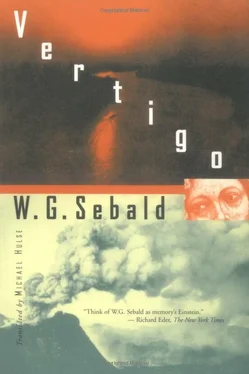Winfried Sebald - Vertigo
Здесь есть возможность читать онлайн «Winfried Sebald - Vertigo» весь текст электронной книги совершенно бесплатно (целиком полную версию без сокращений). В некоторых случаях можно слушать аудио, скачать через торрент в формате fb2 и присутствует краткое содержание. Год выпуска: 2001, ISBN: 2001, Издательство: New Directions, Жанр: Современная проза, на английском языке. Описание произведения, (предисловие) а так же отзывы посетителей доступны на портале библиотеки ЛибКат.
- Название:Vertigo
- Автор:
- Издательство:New Directions
- Жанр:
- Год:2001
- ISBN:978-0811214858
- Рейтинг книги:4 / 5. Голосов: 1
-
Избранное:Добавить в избранное
- Отзывы:
-
Ваша оценка:
- 80
- 1
- 2
- 3
- 4
- 5
Vertigo: краткое содержание, описание и аннотация
Предлагаем к чтению аннотацию, описание, краткое содержание или предисловие (зависит от того, что написал сам автор книги «Vertigo»). Если вы не нашли необходимую информацию о книге — напишите в комментариях, мы постараемся отыскать её.
Vertigo
The Emigrants
The Rings of Saturn
The New York Times Book Review
The Emigrants
Vertigo — читать онлайн бесплатно полную книгу (весь текст) целиком
Ниже представлен текст книги, разбитый по страницам. Система сохранения места последней прочитанной страницы, позволяет с удобством читать онлайн бесплатно книгу «Vertigo», без необходимости каждый раз заново искать на чём Вы остановились. Поставьте закладку, и сможете в любой момент перейти на страницу, на которой закончили чтение.
Интервал:
Закладка:
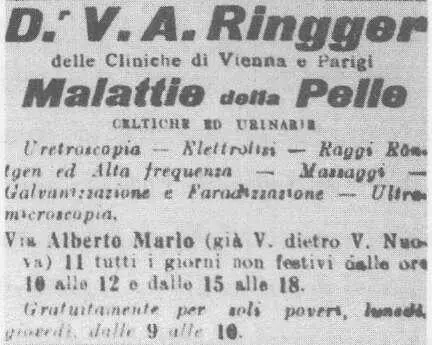
already occupied by an impeccably suited gentleman of the sort that continued to leap in from the street, while Dr Ringger, for his part, was to be seen in the great salon on the mezzanine floor perusing, in preparation for his surgery hours, a range of outsize pictorial reproductions of the inflorescences caused by diseases of the skin, spread out before him on a huge table like the multi-coloured ordnance maps at a war council of the general staff. And then I witnessed Dr Pesavento, whose practice was in the Via Stella, not far from the Biblioteca Civica, performing one of his painless
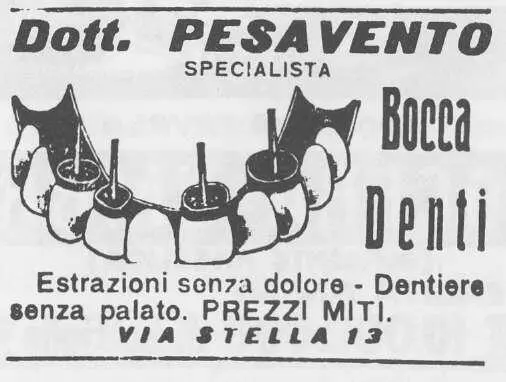
extractions. The pale countenance of the patient under Dr Pesavento did indeed seem perfectly relaxed, but her body twisted and turned in the dentist's chair as if she were undergoing the most agonising discomforts. There were revelations of a different kind, too, such as the pyramid of ten million bottles of Ferro-China table water (to reconstitute the blood), gleaming and glinting in the sun like a promise of eternal
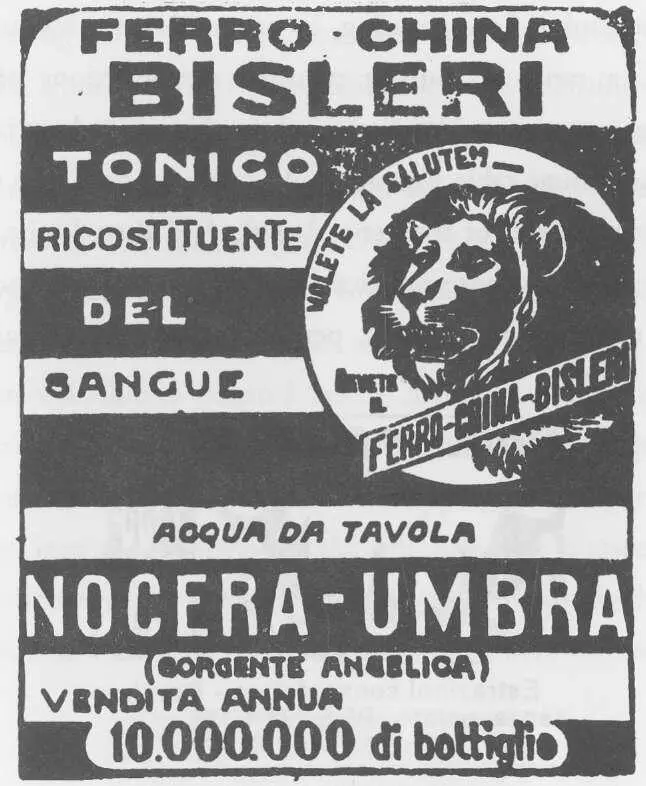
life: a lion roared soundlessly, and soundlessly the pyramid shattered into a myriad little pieces tumbling down slowly in a crystal cascade. They were soundless and weightless, these images and words of times gone by, flaring up briefly and instantly going out, each of them its own empty enigma. The Tyrolese missionary Giuseppe Ohrwalder was reported from Khartoum to have been missing for several weeks at Omdurman in the Sudan. According to telegrams from Danzig, a Colonnello Stern of the 6th Field Artillery Regiment had been arrested there on suspicion of spying: stories with neither beginning nor end, I reflected, which ought to be looked into more closely. 1913 was a peculiar year. The times were changing, and the spark was racing along the fuse like an adder through the grass. Everywhere there were great effusions of feeling. The people were trying out a new role. The sacred and righteous wrath of the nation was invoked. The accounts in the Veronese newspapers of the first festival in the anfiteatro romano sought to surpass each other in their enthusiasm. According to one of my notes, an article in the Fedele was entitled Apoteosi dei titani , in Gothic type. It concluded with the assurance that this headline was no hollow assertion, since the arena was a titanic example of Roman architecture and Giuseppe Verdi the Titan of the melopoea italiana. The true Titan of all art and beauty, however, the writer proclaimed with a final flourish, was il popolo nostro , and all the rest were nothing but pygmies. For a long time my eyes remained fixed on the six letters of the word pigmei , the announcement of a destruction that had already taken place. It was as if I could hear the voice of the people, as it welled up, the violent inflection in the syllables: pig-me-i, pig-me-i, pig-me-i. The shouting roared within my ear, in reality doubtless the drumming of my own blood, amplified and distorted by my imagination. At all events, it seemed to prompt no response in the librarian. Calmly he sat bent over his work, filling the lines he had ruled with an even hand. The manner in which he paused at the end of every line suggested that he was writing a list. And plainly he had every detail he needed for the composition of this visibly lengthening register in his head, for he continued his writing without ever referring to any source. Our eyes met on one occasion when he had completed another page and looked up from his work as he reached for the tin that contained the blotting sand. That gesture, which was so out of time, seemed so wholly right at that moment, and so meaningful, that, reassured, I was able to continue my trail through the papers, and as I went on reading and turning the pages, well into the afternoon, I happened on one thing or another that might well be worth retelling some time, such as the report headed ucciso sul banco anatomico, which began with the truly novelistic words: Ieri sera nella cella mortuaria de cimitero di Nogara, and which dealt with the murder of a carabiniere named Muzio. The story, which did not lack gruesome details, remained in my memory not least because in one of the tomes I was going through I found an old postcard showing the Cimitero di Staglieno in Genoa. I pocketed the picture and subsequently examined every square inch of it through a magnifying glass. The pale light over the dark hills, the viaduct which appears to lead out of the picture and into a tunnel, the deep shadows near it, the numerous tombs in the shapes of towers or pagodas to the right, the cypress grove, the perspective alignment of the walls, the black field in the foreground, and the white villa at the left end of the main colonnaded walk, all of this, particularly the white villa, seemed so familiar to me that I could easily have found my way around that site blindfolded. In the latter part of the
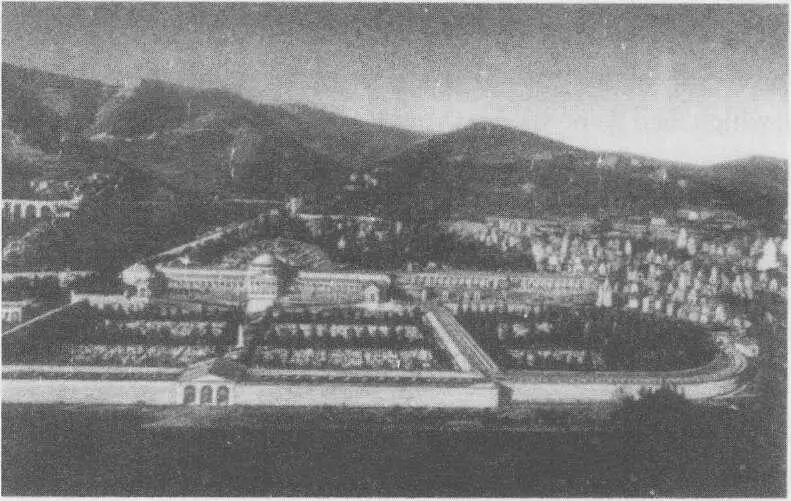
afternoon I walked along the Adige, beneath the trees of the riverside promenade, to the Castelvecchio. A sandy-coloured dog with a black mark like a patch over its left eye, that appeared like all stray dogs to run at an angle to the direction it was moving in, had attached itself to me outside the duomo, and now kept a steady distance ahead of me. If I paused to gaze down at the river, it paused as well and looked pensively at the flowing water. If I continued on my way, it too went on. But when I crossed the Corso Cavour by the Castelvecchio, it remained on the curb, and when I turned in the middle of the Corso to see where it was I narrowly escaped being run over. Once I was on the other side I wondered whether I should carry straight on through the Via Roma to the Piazza Bra, where I was meeting Salvatore Altamura, or should instead make the short detour through the Via San Silvestro and the Via dei Mutilati. All at once the dog, which had kept its eyes on me from the other side of the Corso, was gone, and so I turned down the Via Roma. I took my time, drifting along with the tide of people in the street, going into this shop and that and at length found myself opposite the Pizzeria Verona, from which I had fled headlong that November evening seven years before. The lettering over Carlo Cadavero's restaurant was still the same, but the entrance was boarded up, and the blinds on the upper floors were drawn, much as I had expected, as I realised in that instant. The image that had lodged in my mind when I fled Verona, and which had recurred time after time, with extreme clarity, before I was at last able to forget it, now presented itself to me again, strangely distorted — two men in black silver-buttoned tunics, who were carrying out from a rear courtyard a bier on which lay, under a floral-patterned drape, what was plainly the body of a human being. Whether this dark apparition was superimposed on reality for a mere moment or for much longer, I could not have said when my senses returned to the daylight and the people, quite unconcerned, passing the pizzeria, which had evidently been shut for some time. When I asked the photographer in the shop next door why the business had closed down, he was unwilling to say anything, nor could I persuade him to photograph the front of the building for me. To my questions and requests he merely responded by shaking his head, as if he did not understand me or was unable to speak. As I was turning to leave, imagining this deaf mute photographer at work in his dark room, I heard him utter a screed of savage curses behind my back, curses which seemed directed less at myself than at some incident which had happened in the restaurant next door. Out on the pavement I wandered irresolutely to and fro before at length I approached a passer-by who seemed suitable for my purpose, a young tourist who came from the Erlangen area, and asked him to take a photograph of the pizzeria for me, which he did, after some hesitation and after I had given him a ten mark note to cover the cost of sending the picture to England in due course. When,
Читать дальшеИнтервал:
Закладка:
Похожие книги на «Vertigo»
Представляем Вашему вниманию похожие книги на «Vertigo» списком для выбора. Мы отобрали схожую по названию и смыслу литературу в надежде предоставить читателям больше вариантов отыскать новые, интересные, ещё непрочитанные произведения.
Обсуждение, отзывы о книге «Vertigo» и просто собственные мнения читателей. Оставьте ваши комментарии, напишите, что Вы думаете о произведении, его смысле или главных героях. Укажите что конкретно понравилось, а что нет, и почему Вы так считаете.
